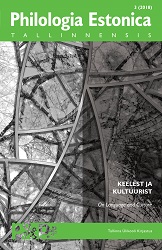The Early Expression of (Un)certainty in Typologically Different Languages: Evidence from Russian, Estonian and Hebrew
The Early Expression of (Un)certainty in Typologically Different Languages: Evidence from Russian, Estonian and Hebrew
Author(s): Victoria V. Kazakovskaya, Reili Argus, Sigal Uziel-KarlSubject(s): Language studies, Language and Literature Studies, Finno-Ugrian studies, Eastern Slavic Languages, Philology
Published by: Tallinna Ülikooli Kirjastus
Keywords: Epistemic modality; first language acquisition; child-directed speech; Russian; Estonian; Hebrew;
Summary/Abstract: The article discusses the early means of expressing the epistemic notions of certainty and uncertainty (epistemic markers) in three typologically- diffe-rent languages – Russian, Estonian and Hebrew. The results are based on an analysis of naturalistic speech samples of 9 typically-developing monolin-gual children, recorded from ages 1;3 to 6;2. The emergence of epistemic markers in child speech is compared to child-directed speech. Acquisition of means of expressing epistemic modality starts to develop at the end of the second year of life with the marking of uncertainty. The findings indicate an expansion of epistemic evaluation from objective situations in the physical world to the mental world. A comparison of child speech with the input re-veals that both the frequency of a marker in the target system and the degree of epistemic semantics influence its emergence and development. Dif-ferences between languages mostly concern the frequency of usage of epis-temic markers and the degree of epistemic evaluation children start with.
Journal: Philologia Estonica Tallinnensis
- Issue Year: 3/2018
- Issue No: 1
- Page Range: 95-130
- Page Count: 36
- Language: English, Estonian

